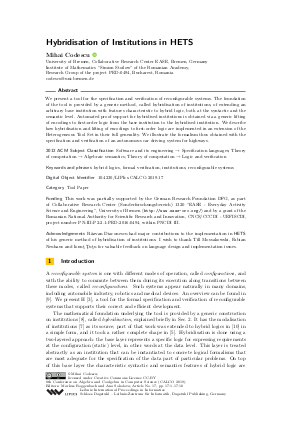LIPIcs.CALCO.2019.17.pdf
- Filesize: 444 kB
- 10 pages

 Creative Commons Attribution 3.0 Unported license
Creative Commons Attribution 3.0 Unported license

We present a tool for the specification and verification of reconfigurable systems. The foundation of the tool is provided by a generic method, called hybridisation of institutions, of extending an arbitrary base institution with features characteristic to hybrid logic, both at the syntactic and the semantic level. Automated proof support for hybridised institutions is obtained via a generic lifting of encodings to first-order logic from the base institution to the hybridised institution. We describe how hybridisation and lifting of encodings to first-order logic are implemented in an extension of the Heterogeneous Tool Set in their full generality. We illustrate the formalism thus obtained with the specification and verification of an autonomous car driving system for highways.

Feedback for Dagstuhl Publishing